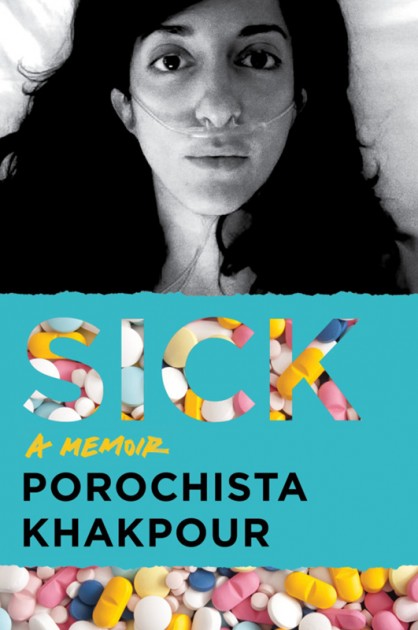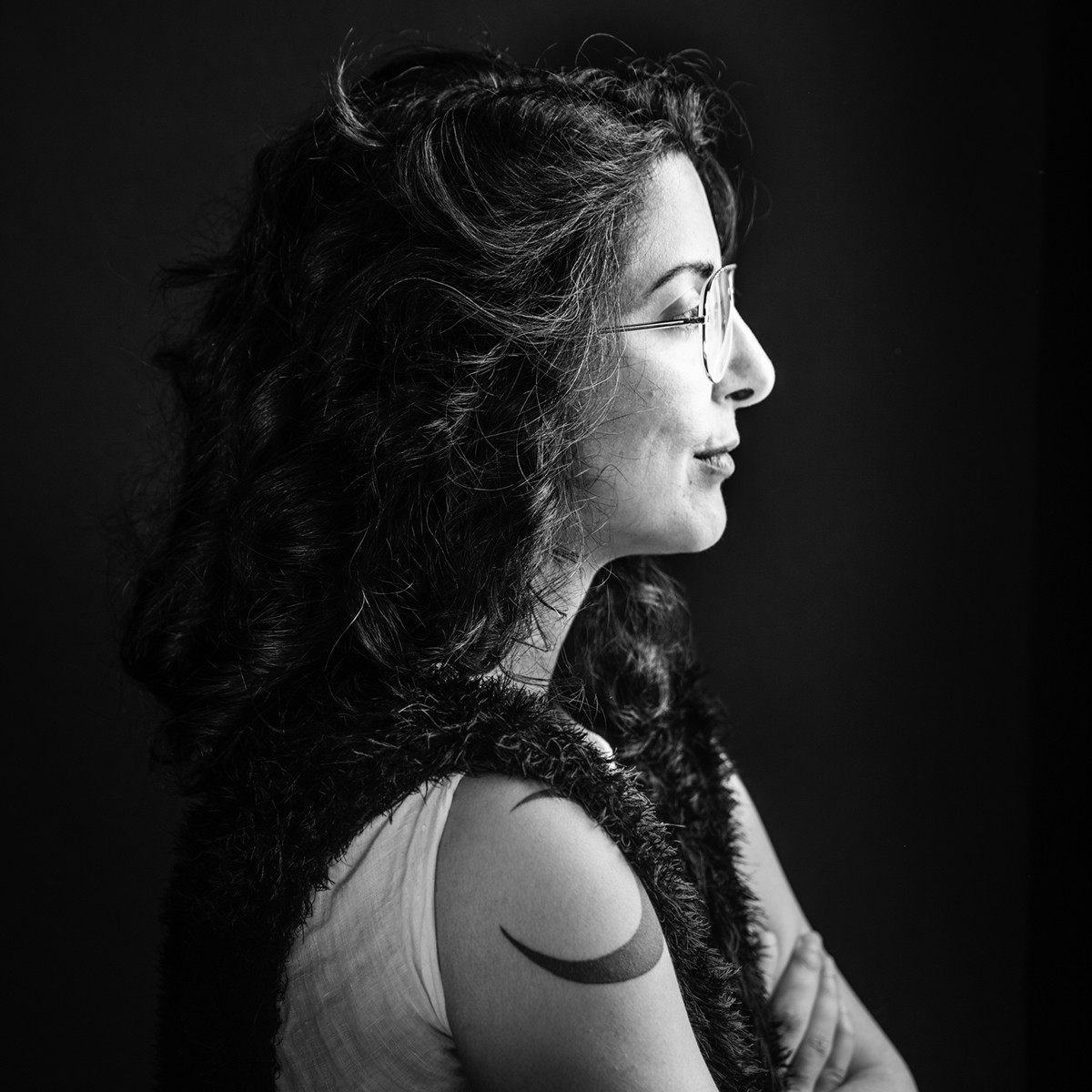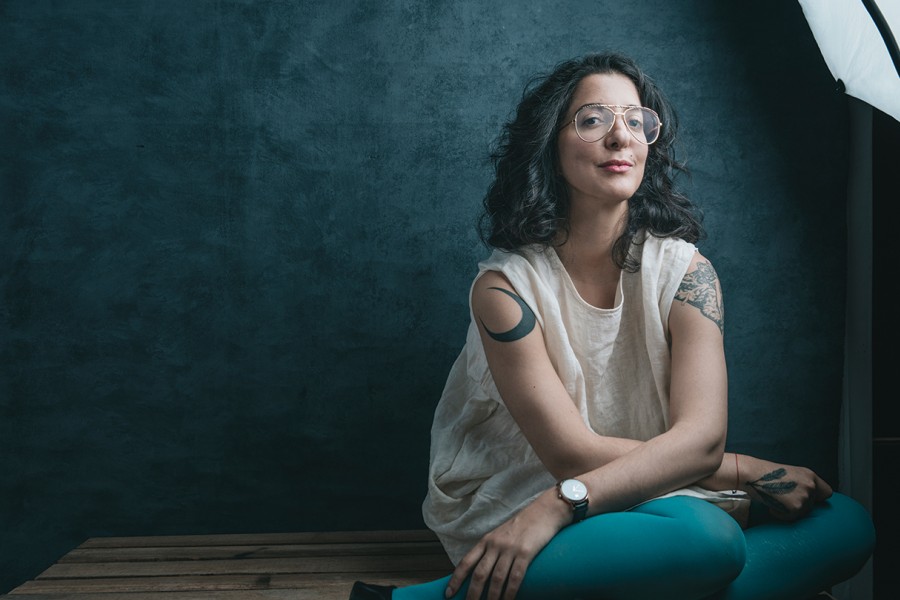In early April, novelist Porochista Khakpour was sitting in a New York City emergency room. As somebody living with late-stage Lyme disease, she is a reluctant ER veteran, aware of when, and why, she needs to seek medical assistance. On this day, it was her heart. She needed to make sure it was, well, beating as it should.
The Centers for Disease Control and Prevention estimates that 300,000 are infected by Lyme each year; it's the fastest growing, vectorborne infectious disease in the country. As Khakpour, A&S '02 (MA), notes in her new book, Sick: A Memoir (Harper Perennial), less than 10 percent of estimated Lyme cases have been confirmed by the CDC-recommended two-step testing process. She's one of those confirmed cases. One of her doctors has guessed that she was infected sometime between 2006 and 2009, though her medical history suggests she may have been infected much earlier. The bacterial infection is spread by the eastern or western blacklegged tick. It initially presents only with fever, headache, and fatigue, but if the infection goes undetected and untreated, other conditions arise. These can include facial palsy, insomnia, depression, chronic pain, mental fogginess, impaired motor function, mood changes, and general feelings of unwellness. The problem is that this combination of symptoms can suggest any number of other conditions. If a patient is unaware of a tick bite, the possibility of Lyme may never come up.

Image credit: Harper Perennial
Among Khakpour's late-stage Lyme-related conditions: fatigue, insomnia, aching joints and muscles, arthritis that requires walking with a cane, and peripheral neuropathy that produces unthinkable pain. She's usually able to ignore all of that. Chest pains and heart palpitations, though, make her nervous. They could be indications of Lyme-related dysautonomia, the malfunctioning of the autonomic nervous system that normally regulates unconscious actions such as the heart and respiration. In her case, her blood pressure drops dangerously low while her heart rate spikes. And it's one thing to feel extremely tired from not being able to sleep, or acclimate to the level of constant pain she's in. It's another to worry if her brain isn't adequately telling her body, keep moving blood or, you know, breathe.
Which is what brought her to the ER at NYU Langone Medical Center in April. Earlier this year, she returned to her Harlem apartment after some work-related travel to find renovations going on in her century-old building. The construction caused the ceiling of her bathroom to collapse, scattering asbestos, debris, lead paint, and mold, none of which are particularly hospitable to somebody chemically sensitive and prone to shortness of breath. She and her dog, Cosmo, stayed at a hotel for a bit, and then crashed with friends who had a spare bed or were out of town, exacerbating her Lyme symptoms to the point of seeking medical assistance. Over her nine-hour visit, she received two liters of IV fluids, oxygen, and a battery of X-rays and tests. Afterward, she tweeted out a short update about her condition and experience to more than 20,000 followers, adding "I would really like to never return to a hospital but that dream has become silly by now."
Khakpour has candidly talked about living with her disease on social media since 2012, after her diagnosis was confirmed. She discusses the unrelenting pain, having to travel with medical oxygen, her insomnia and interrupted sleep patterns, the costs, the fears, the ER visits, and the online network of women dealing with chronic illness. Even if you've followed her on Twitter or Facebook, Sick is a revelation, as Khakpour wraps her Lyme disease inside a grander, metaphysical reflection on overall feeling out of place in her own body. Born in Tehran, Iran, in 1978, Khakpour immigrated to America with her parents following the Iranian Revolution, settling in Los Angeles where she grew up. She earned a scholarship to Sarah Lawrence College, a campus but an hour's train ride north of New York City, and for most of her adult life she's bounced between New York and LA, with shorter stays around the country wherever graduate school, adjunct teaching jobs, and writer's residencies have taken her. Baltimore. Chicago. Santa Fe. Bucknell University. Bard College. The University of Leipzig.
It has been very scary to realize how close i was to dying again the past few months in New York. I am trying to let go of a lot of fear & move forward.
— porochista khakpour (@PKhakpour) May 10, 2018
In Sick, each setting unlocks a digression into experiences that don't always have anything to do with Lyme disease, specifically, but have everything to do with being a young writer trying to forge a career while slowly learning she has a chronic illness. There are relationships that blossom and wither—or explode. There are the writing, editing, and teaching jobs she takes to make a living. There are the recurring spells of insomnia that first began in her teens. There are trips to emergency rooms and doctors' offices where her symptoms are thought to be any number of things—amyotrophic lateral sclerosis? brain damage? diabetes? endometriosis? lupus? multiple sclerosis? ovarian cancer? Parkinson's?—except Lyme.
There's also a sexual assault. Panic attacks. And experiences with depression and anxiety for which she's overmedicated. There's a 2005 taxi accident that required surgically sewing a piece of plastic into her face to repair part that had been torn off. Thoughts of suicide. And casual drug use. There's a concussion following yet another car accident. And there's the author seeking any kind of relief from all of the above in many of the nontraditional treatments and specialists—yoga, acupuncture, ayurvedic doctors, holistic medicine practitioners, a healing center she suspected of being a Scientology front, a psychic healer—that the multibillion-dollar wellness industry offers.
By the time Khakpour begins talking about the confirmation of her Lyme diagnosis in 2012 and finding the Santa Fe clinic that sends her into remission for the first time, Sick feels less like a Lyme-specific memoir and more of an immersion into one woman's life where chronic illness is but one of many discombobulations that make her feel mentally and physically out of sorts. It's a compact dispatch from a middle-class, Iranian-American Muslim woman in early 21st-century America, where there are many, many reasons why one might be ill.
The book is a reminder that it's not the disease that makes you wish for oblivion, it's the living with it. "There are some things you come to recognize as typical of Lyme because a body is oftentimes freaking out," Khakpour says during a late April interview. "Today I had this really horrible, burning headache that's very typical of Lyme. It just feels like your whole brain is on fire. It's really awful.
"I've never had the privilege to devote three years of my life to Lyme therapy, which is what would probably be the thing that would make me better," she adds, noting that she can't afford to do nothing but invest in the multimodal therapy that puts her into remission. Currently, no test exists that accurately proves the bacteria that cause Lyme have been eradicated from a patient. "When I devote myself entirely to my Lyme cure then I do see results, but that's the big problem. How can you afford to treat this? How do you give it the time? And how do you do it when you live alone?"
Khakpour managed her own interview schedule for Sick's release earlier this year, which meant I was pestering her with texts and emails during that time she was bouncing from hotel to friend's couch to ER. By late April, she had left New York to stay with her parents in Los Angeles, and late one afternoon she jokes about ingeniously using Southern California's infamous gridlock as a scheduling aid. "In LA, there's inevitably traffic, so it might be the perfect way to do interviews," she says by phone from the San Fernando Valley. She's in the car with her mom, who's driving her to a medical supply store in Sherman Oaks. It's where Khakpour first picked up the portable oxygen concentrator she uses to fly. "In New York," she observes, "people are very paranoid about this stuff in airports because of bombs." It's a casual observation of these absurd times, where a medical device is regarded as a potential threat.

Image caption: Porochista Khakpour
Image credit: Marc Olivier Le Blanc
In conversation Khakpour occupies the same smart, earnest, and at times darkly witty register familiar to her social media activity. In April 2016, she tweeted out a series of "cool tips for a Lyme-free spring." Advice included: "pray, to Satan," "never leave yr house," "wear a space suit in the wild, but also at home," "pop doxycycline like it is yr new Adderall," and "live in yr local ER." She's widely intelligent without the need to prove it constantly and able to juggle a dozen ideas in a disarming thought by the time she reaches the end of a sentence. Her medical oxygen helps her breathe, especially when she's staying with her parents in Los Angeles. "Just looking around right now the sky is basically gray, not the cleanest," she says, adding that her oxygen "is something I'm going to need a lot more of in the world from now on. I've just become so sensitive to air."
That sensitivity, like her chemical sensitivity, is a by-product of living with late-stage Lyme, where things most of us might not notice produce adverse reactions in her body. When she's feeling well enough, she tries to squeeze in as many tasks as she can. "That's why sometimes it's a bit last-minute-everything with me," she says, and apologizes for having to reschedule recent interview plans. "I've definitely been worse in the last few weeks."

Illness was never the subject Khakpour thought would occupy her writing. In fact, she never thought she would be the subject of her writing. "I was never interested in writing nonfiction or writing about myself," she says. "I only wanted to be a fiction writer." Khakpour's celebrated first two novels, Sons and Other Flammable Objects (Grove/Atlantic, 2007) and The Last Illusion (Bloomsbury Publishing, 2014), established her as an imaginative writer capable of crafting prose with hallucinatory power. Both novels, explicitly and indirectly, deal with living as an Iranian and Muslim in a post–September 11 America where history, myth, and politics coil around her characters' lives. The stories in these novels inch forward and circle back, stitching her characters and the times in which they live into rich tapestries.
During these years, Khakpour became an explorer and chronicler of the Iranian-American experience and Iranian literature in reviews and essays that appeared in Harper's, The New York Times, Los Angeles Times, The Wall Street Journal, Al Jazeera America, The Paris Review, and others. A number of these previously published essays, along with a new piece, will be gathered in a 2019 collection called The Brown Album—a title that nods at Joan Didion's The White Album, which was about America in the 1960s and 1970s, while cheekily spotlighting Didion's privileged perspective.
Also see
Those essays are worth mentioning here because so many of them are animated by the heady, maximalist style of Khakpour's fiction. She's one of those writers who can make experimental excursions accessible, as in "How to Write Iranian-America, or The Last Essay." In this 2017 piece, which appeared in the literary journal Catapult, Khakpour flirts with the imperative mood and second-person voice to reflect on how the personal essay can sometimes feel like a straitjacket: "Tell yourself this is The Last Essay, but remind yourself of all the other Last Essays. Wonder how much more of this you can take. Count that out of seventy pieces of nonfiction you've written since your first book came out in 2007, forty-eight have had to do with Iranian-America. Ask yourself if it's too much or too little given where America is at, still at. Watch the news and marvel at how your entire life they obsessed over your country of origin, and continue to. Wonder if you and your family will end up in Muslim Camp after all. When people look at you with the pity and the regret again—refugee, resident alien, political asylum, immigrant, foreigner—let them have it, and let yourself take it. What has changed but nothing at all?"
Sick harnesses a different kind of power. Khakpour tells her story in a chronological series of chapters that are occasionally separated by interludes that act like metanarrative fugues: the experience of always feeling out of place in your body, who gets to count as your support network when you know family is out of the question. For the most part, she narrates her story without discursive flourish.
That story begins with a crash. In December 2015, the car she was driving was hit by an 18-wheeler on the New York State Thruway when she was returning to the city from teaching at Bard College, just north of Poughkeepsie. The truck overtook her at speed, clipping her vehicle and sending her spinning and crashing to a stop on the roadside. Cosmo, who had been sleeping in the back seat, was shaking but OK. The police eventually showed up, and a tow-truck driver gave her and Cosmo a lift home. The driver, after learning her last name, told her that "you Arabs have not been my favorites" but that she was a "good rep for your people." He was letting her know her people needed one, after all, given the attacks that had recently happened in Paris. She didn't tell him that Persians and Arabs are distinct ethnic groups, with different languages, cultures, and histories.
She had hit her head during the crash, and her friends urged her to make sure she didn't have a concussion. She had already spent enough time in hospitals for two lives, but she allowed a friend to take her to the ER, where she was seen after a few hours' wait. When she told the attending physician that she had Lyme and didn't want a CT scan because radiation is immunosuppressive, he grinned in a way she had both feared and expected. Because not every person who may be Lyme-infected can afford the two-stage testing process that CDC recommends, some doctors are skeptical of patients who claim a Lyme diagnosis. She felt like this one wasn't taking her seriously, a recurring feeling she's experienced in ERs and hospitals over the years.
Though an infectious disease doctor first told her she probably had Lyme disease in 2009, Sick documents how she had a number of her Lyme-related symptoms for much longer, so it's impossible to estimate with any accuracy when she was infected. And before her Lyme was confirmed, she was misdiagnosed for a laundry list of other potential ailments and conditions, with some doctors even suggesting that she was merely psychosomatic and should seek mental health care before considering any further medical testing.
In the ER after her car accident, that doctor's skeptical grin brought those feelings back. She was discharged with some Tylenol and a recommendation to follow up with her Lyme doctor. Once home, she told friends she was fine, not having the energy to unpack how living with Lyme often makes seeking treatment for other problems feel frustratingly futile. She wasn't fine, but "what I meant was I did not have room for this new thing that happened to me, this thing that was making the old thing worse."
One of the hardest parts of waking up from a crisis is how to pick up the pieces. But instead tonight my goal is to see if i can again wash my own hair.
— porochista khakpour (@PKhakpour) April 29, 2018
The writing throughout Sick is equally direct, blunt, and unadorned. The combination gives the book the closeness of hearing somebody's life story while seated next to them on a long plane trip. "People have been very kind to say this memoir is well-written but it's not well-written to my standards," Khakpour says. "I would like the writing to have been stronger, but the truth is, I was writing it around a lot of difficult years where I was ill. It was the best I could do."
She sounds almost surprised that her illness became her third book. "I never thought this would be a big issue in my life. [But] I had only a few choices. Devote my life to writing 10 million personal essays about illness or to write this one book.
"I guess a part of me hoped that I would just be done with it," she continues. "Maybe the magical thinking part of writing makes you think, Once I write this, then I'll be well and I won't have to think about it. But, of course, that didn't happen. That's not how my illness works. You don't just get rid of it."
The opening scene introduces what Sick explicates with a frightening acuity: chronic illness's inescapable omnipotence. Khakpour captures what it's like to be a person who knows something's wrong but doctors can't figure it out. It's easy to forget how often medicine is a matter of statistics, that treatments, interventions, and pharmaceutical regimens become standards of care because they work in the majority of cases. When you're a minority case, being exposed to gaps in medical expertise can be chilling. Every trip to a doctor involves a retelling of a medical history, possibly amended and updated depending on what you learned about your condition at your last visit.
Patients living with chronic illness wander their own personal Borgesian labyrinths. "All I end up doing is getting well enough so I can work so I can pay for the Lyme treatments," she says. "That cycle that I'm in is really frustrating, between relapse and remission. When I'm in remission I'm trying to avoid a relapse, I'm just trying to earn money. But then all the working makes me sick. It's a loop."
In one of Sick's interludes, Khakpour mentions giving a talk in 2017. A woman, who said she was also ill, asked her about how she deals with the personal things—the stress of family, the lack of money—which can sometimes be worse than being sick. It's a setup for exploring the ostensible "support system" that health care providers say people living with chronic illness need, that is, a family network that can help out.
Sometimes, Khakpour notes in this interlude, the most supportive members of that family might not be people you're related to. Support can come in many forms. Asking for help—in Sick, Khakpour includes the email she sent to her New York friends and colleagues after she first learned of her Lyme diagnosis, saying she was going to need help now and again, even if it was taking Cosmo for a walk or helping her get to a doctor's appointment—can be hard, and she felt embarrassed having to ask. In 2012, she crowdfunded assistance to help her pay for her initial treatment and testing. It was the only way she could afford, as she writes, "this incredibly expensive journey." In May, another crowdfunding effort was launched to assist with treatment costs following her exposure to mold in April.
She's currently a faculty member at MFA programs at the University of Southern Maine and the Vermont College of Fine Arts, and for the first time she taught her students remotely for the spring 2018 semester. She's also working as an editor with the online publication Medium, curating a new series called Off Beat, where she's inviting writers and journalists to research, report, and craft those stories they never get to write, the ones outside their usual areas of expertise. And she's working on her own articles, essays, and books, including The Brown Album and Tehrangeles, her third novel, slated for 2020.

Image caption: "There is a legitimate need for real stories. There is a huge world of chronic-illness activists, but a lot of them are in bed at home," says Porochista Khakpour
Image credit: Marc Olivier Le Blanc
Still, her income is entirely from teaching and writing, which means it's modest. In March, when the current administration was trying to repeal the Affordable Care Act and push its bill through the U.S. Senate, social media was awash in status updates and Twitter threads about medical costs. Khakpour joined in, tweeting: "Cost of my late-stage Lyme all these years & counting? Somewhere around 140K last I counted."
Nothing about living with chronic illness is cheap. "One of the reasons I wrote this book is because almost every book I ever read that had anything to do with Lyme was always about these rich white women," Khakpour says. She doesn't mention any of the following, but on Amazon, Sick occupies a list of Lyme-tagged books alongside Believe Me: My Battle With the Invisible Disability of Lyme Disease by Real Housewives of Beverly Hills co-star Yolanda Hadid; Bite Me: How Lyme Disease Stole My Childhood, Made Me Crazy, and Almost Killed Me by Ally Hilfiger, daughter of fashion designer Tommy Hilfiger; and There Is No F*cking Secret: Letters From a Badass Bitch by television personality Kelly Osbourne, all of which came out in the past two years.
"I couldn't relate to any of what they had to say or the roads they took," Khakpour continues. "It's such a celebrity culture around it too, and that's the thing about Lyme that kills me. I have certain privileges and I'm able to afford some things. If I didn't, I would have been one of those people who would die of Lyme because my situation was so bad. There's a reason people associate Lyme with the privileged or celebrities and all that. It's because those are the people who can afford to get tested in the first place."
There is a growing, active online community of chronic-illness activists and people living with chronic illness, many of whom are women looking for stories in which they can see themselves. "There is a legitimate need for real stories," Khakpour says. "There is a huge world of chronic-illness activists, but a lot of them are in bed at home. I have found it really heartening that those communities exist and that it is actually acceptable. If you're like me right now, with the cane and the oxygen concentrator and all dizzy and blah, blah, blah, you can't really go out into the streets, which is much more what you imagine when you think of the word 'activist.'"
This community is one of the big reasons why she posts so much about her illness to social media. It's a form of solidarity, a bit of uplift, and, yes, it can also make her feel seen and heard by tweeting a selfie while sitting in a hospital room taking IV fluids. "In a way, though, it never feels like enough," Khakpour says of such activity. "I feel like I should be doing more for the world than just telling my story."
In January 2016, the online magazine Mask published Johanna Hedva's essay "Sick Woman Theory," in which the genderqueer artist pushes back against Hannah Arendt's definition of the political as any action performed in public. Hedva, who lives with chronic illness, was curious: Are people who can't access the public cut off from political discourse and forms of protest? Hedva goes on to thread current notions of "sickness" and "wellness" into capitalism's need to have well bodies to participate in its consumer cycle. And in Hedva's argument, "The most anti-capitalist protest is to care for another and to care for yourself. ... To take seriously each other's vulnerability and fragility and precarity, and to support it, honor it, empower it."
In other words, a sick story's power may reside in the fact that it's usually withheld from the public sphere. It's private. It can make you feel alone. Perhaps sharing that sense of isolating intimacy can bring people together.
Sick's potency certainly sprouts from the intimate solidarity of Khakpour's writing. While at a book festival in Australia, Khakpour recalls Eat, Pray, Love author Elizabeth Gilbert saying she wrote each of her books as though it was meant for a particular person. Hmmm. "I thought of this [book] as if someone were to see me being fairly disabled they'd say, 'What happened to you?'" Khakpour says. "I would say, 'OK, have a seat, how much time do you have?' And Sick is what I would tell them."
Posted in Health, Arts+Culture, Voices+Opinion
Tagged lyme disease, memoir, lyme's disease











